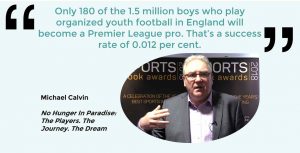Most parents who approach me to help their child are clueless about the prospects of a football career and what it would really take to get their child to be a successful player.
This is not surprising to me, given that there is such little information anywhere on how one can become an elite footballer. This is what motivated me to come out with the Masterclass – to share the proven method that I have learned from the best talent wellsprings Worldwide and have implemented through the players working with me – some of who have achieved tremendous early success already.
But those who are not yet familiar with such insights tend to rely on guess work to best support their child’s passion. Unrealistic expectations on what is needed further reduces the already slim chances of success. The main issue is ignorance - because they are unable to cross-references or compare the football career path with other fields.
To increase the chances of success of becoming a professional footballer, one must know how steep the challenge is and what are the potential issues that need to be addressed in order to have better prospects.
Nature of the Challenge
In contrast, the chances of success in the IIT JEE, which is one of the most competitive exams anywhere in the World, is 10 times higher (roughly 1%).
The promising players in top-level English football academies are selected and trained by well-funded professional clubs that employ highly experienced scouts and coaches. Player recruitment and training there is driven by merit.
On the other hand, in Pay-and-Play ecosystems like India and US, chances of a young player succeeding - without proper interventions that bypass the all-prevalent systemic challenges - are far lesser.
By now, you may be wondering, why is a football career so tough?
Reasons for the Lower Odds of Success
1. Non-Uniformity in Selection Process
- Selection of Footballers is similar to that of Special Forces
a) Many dimensions are tested – not just current ability but also physical fitness and personality traits - unlike most other fields;
b) Exact criteria for selection are not shared (beyond some basic outlines); and
c) The selection criteria can differ from place to place

- Furthermore, there is no uniformity in recruitment. The selection criteria keep changing depending on age group and playing style.
For example, Manchester United and Manchester City prefer different type of players in the same position – even at younger ages. This is within the same city - there are far bigger regional and national differences in priorities, as you can imagine.
- While some basic elements for selection will be obvious (degree of ball control for example), there are significant Positional variations too. Forwards/Midfielders/Defenders/Goalkeepers – are all judged based on different criteria. Even in the same position, there are major differences – Strikers will be evaluated differently compared to Wingers for example.
- This is why so many players who are academy rejects at younger ages have gone on to become top footballers (the Ronaldo example from the Masterclass).
Very few entrance tests – globally - are this comprehensive or this complicated.
2. Complexity of Learning
- One’s learning in Football is not just influenced by good coaching but also all the other elements in the Player Ecosystem (inside and outside the ground) –including quality of teammates and competition as well as all the other direct and indirect elements that are explained in the Masterclass;
- Competitive benchmark is absent usually – it is not easy to figure out how good one is in relation to the best in that age group, in that position - unlike individual sports, where one can rely on tournament results to gauge this;
- Learning needs are dynamic as playing styles evolve – it is a moving target, not a fixed one – and learning is truly life-long (or at least career long!)
The competition is extremely steep and the path to it is not clearly mapped out anywhere.
3. Scarcity of Openings
- Every year, a similar number of promising young players graduate from all the football academies. But the same number of players don’t retire every year. The ratio of retirees is very less compared to new graduates.
- And - unlike other industries, the total manpower size remains constant – market expansion doesn’t happen regularly (if it happens at all).
- It is also not easy for young, untested players to replace older, more experienced players at top-flight football. Experiential learning is a fundamental requirement in football, and the absence of enough match exposure leads to a Catch-22 situation for young players and clubs.
- All these factors lead to few openings in professional football for new players.
This is why becoming a Pro-Footballer is one of the toughest tasks in the World. Getting in is very hard (fixed spots/high competition). But once you get in, to replace you is also not easy.
The Biggest Mistake That Parents Make Due To Ignorance
Logic dictates that if one is aspiring to clear a test that is 10 times tougher than getting into IITs, then one should also prepare that much better/smarter.
Yet, most Parents rely on some random selection/scholarship to confirm their child’s football potential – before considering any special preparation to improve in the game.
Whereas the same Parents wouldn’t think twice in spending thousands of dollars on their child’s IIT-JEE preparation or any other similar competitive exam in the more traditional career paths, if their child shows interest in that direction.
What is amazing is that the same Parents don’t spend a moment to pause and think what is better:
a) to get a scholarship now and save some money on training while reducing chances of future success or
b) to invest some money on the necessary training needs and have much higher chances of future success.
Surprisingly, they choose the first option and reduce their child's success odds even further.
How To Overcome These Low Odds and Succeed Smartly?
Becoming an elite footballer is certainly not easy. But, on the other hand, there are not many who are working towards that objective with a properly defined roadmap and well-thought through preparation. Majority of players are training in the same manner as everyone else – and in the process they are all relying on hope and luck to get through.
Unlike the competitive landscape in other fields, where success path for the entrance tests is better laid out and lot more serious students in comparison to football are working towards it.
It is natural then that the ones who plan better and prepare smarter in Football compared to the rest – with extra/specific inputs based on competitive benchmarking and assessments and utilizing deep game analytics in multiple ways – will progress much faster than the rest.
And they will also have far higher chances of success than those in other fields even. Simply seeking external validation from random selection trials or scholarships will not work in poorer football ecosystems.
As they say, being well-prepared is half the battle won.
This is a universally proven and fool-proof formula for success and I have personally seen outstanding progress for some of the players in our program with this already - within the span of just one and a half years.
Please keep this in mind when you go around seeking the best football inputs for your child.
Key Takeaways
- A Professional football career is not easy to achieve – odds of success are low
- Many Parents worsen those chances through wrong priorities: selections/scholarships
- A well planned and smarter strategy multiplies the chances of success significantly


NO COMMENTS